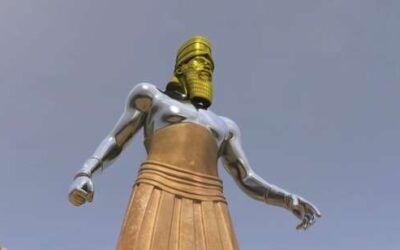Is Demon Possession Real? Here’s What the Bible Says
The topic of demon possession can be brought to mind from stories, movies, the Bible, or even as a metaphor. And it can include mental images of people behaving in disturbing, erratic, or unnatural ways.
Every now and then, we might hear a joking comment about misbehaving children or high-energy animals being “possessed.”
However this subject might come up, there’s no question that it can stir up a range of internal reactions, like curiosity, skepticism, or even downright terror.
But regardless of how we feel, it also seems so extreme. So it’s certainly common to wonder…is demonic possession even real?
The short answer is yes.
There are multiple cases of demonic possession that show up in the Bible. Some examples include the man possessed by the infamous “Legion” and the girl who had a spirit that acted like a fortune teller (Luke 8:26-30; Acts 16:16).
There’s good news, though! We don’t have to live in a state of fear about possession because demons don’t stand a chance against Jesus (Luke 4:36).
Let’s see how the Bible gives us some answers about the nature of demonic possession and how it relates to the ongoing conflict between God and Satan.
As we dive into Scripture, we’ll get a better understanding of:
- What demon possession is
- What the Bible says about demonic possession
- What can be done about it
- Whether we need to fear demon possession
Let’s start by defining demon possession.
NOTE: This page is not about diagnosing possession or providing exorcisms. If you feel like you’re experiencing unusual symptoms or feelings of anxiety and depression, we encourage you to seek out professional help. We also suggest seeking pastoral counsel if you’re struggling more spiritually than mentally.
What is demonic possession?

Image by Andrea Piacquadio
Demon possession can be described as a demon having control over a person’s mind and body.1 This means the person loses all or most of the control of themselves when a demon takes over as a puppeteer of sorts.
This is different from demonic oppression or harassment.
Oppression comes from a demon trying to influence someone’s mood, beliefs, or decisions. Unlike possession, this doesn’t involve full access to a person’s mind.2
Demons may try to oppress someone by finding ways to affect their physical, mental, or spiritual well-being.
This whole concept can be tricky to navigate because we already live in a world broken down by the effects of sin, and that can be enough to affect our bodies and minds.
And demonic possession and oppression can happen without it being that person’s fault.
While not everyone wants to be under a demon’s influence, there are some who willingly become possessed because they get something out of it. You might have heard stories of people letting spirits use them to perform miracles, predict the future, and even communicate with the dead.
Other times, a demonic influence might deceive a person into a state of willingness.
But before getting to any of the mechanics of demon possession, let’s be clear about what “demons” are, and why they’d want to control or influence anyone.
What are demons? And what’s their motive?
In short, demons are fallen angels who joined Lucifer in his rebellion against God.3 They follow Lucifer (now called Satan) as their leader to turn as many people away from God as possible by making them resistant to the Gospel and the character of Jesus (2 Corinthians 4:4).
Their goal is to deceive and cause us to “depart from the faith, paying attention to deceitful spirits and the teachings of demons” (1 Timothy 4:1, CSB).
But even though humans seem to be Satan’s preferred targets, he’s really going after God.
As Lucifer, he became self-absorbed and obsessed with increasing power—to the point where he wanted to become God. That prompted his rebellion—and his fall from heaven (Isaiah 14:12-15).
Because God is more powerful and beyond his reach, Satan wants to hit Him where it hurts by going after what God loves most—us (Revelation 12:10; Zechariah 2:8).
Think about people who have a bitter grudge against someone, and how they often try to convince others to join them in hating that person, too. They may also harass those who have a good relationship with the person they don’t like, or try to get that person’s supporters to switch sides.
Satan has similarly tried to get humanity away from God for centuries by gaining control over their lives. In some cases, either by influencing them or flat-out possessing them.
But the Bible gives us some insight into the nature of demonic possession and how it’s been dealt with.
How does the Bible describe possession?

Photo by Susan Holt Simpson on Unsplash
When the Bible describes demon possession, it often refers to someone being “possessed” or being tormented by “unclean spirits.”4
The Greek word for “demon-possessed” is daimonizomai, which can mean “to be under the power of a demon.”5 People who were said to be demon-possessed often experienced severe physical and mental suffering, and sometimes the demon spoke through them.6
It’s important to note that demon possession is different than medical conditions. While some symptoms may overlap and have characteristics of physical ailments or mental illness, it’s helpful to determine the distinction, and it may be necessary to seek professional help.
Health challenges are effects of living in a sinful world. And demonic possession is part of spiritual warfare.
When we say “spiritual warfare,” we’re not talking about a fantasy spirit world with angelic beings blasting each other. There is an unseen battle of hidden angelic forces, but it’s not a physical, hand-to-hand battle like we might think of in movies or games. It might be better represented by espionage. It’s a battle involving will, influence, truth, intent, and allegiance.
Scripture says that we battle “against the rulers, against the authorities, against the cosmic powers over this present darkness, against the spiritual forces of evil in the heavenly places” (Ephesians 6:12, ESV).
In the case of demonic possession, evil forces use someone as a tool to cause deception and pain. We could consider it a counterfeit to the Holy Spirit dwelling in us and leading us to do good things that benefit others.
The Bible gives various accounts of demonic possession. In each case, the demon takes over a person’s will. Yet Jesus always proves to be more powerful, always able to drive the demon away (Matthew 8:16; Acts 16:18).
Here are a few examples from the New Testament:
- The man with a legion of demons
- A man’s son and a Greek woman’s daughter
- A fortune-telling slave girl
- And Judas, Jesus’s disciple-turned-betrayer
The Man with “Legion” (Mark 5:1-20; Luke 8:26-39)
One of the most famous cases in the Bible is the man who was possessed by a large number of demons who called themselves “Legion.”
The word “legion” is a military term for “the largest unit of the Roman army, consisting of up to 6,000 men.”7 That means the poor guy might have had up to 6,000 demons swarming inside him!
The demons drove him into the wilderness, where he lived among tombs. He wandered around without clothes, hurting himself and making loud, random cries. If anyone tried to restrain him, he’d break free.
When Jesus commanded the Legion to leave, they spoke through the man and begged not to be tormented. But they must have known they were powerless against Jesus because they asked to enter a nearby herd of pigs.
As soon as Jesus told them to go, they possessed the pigs, sent them over a cliff, and drowned them all!
Word got out fast, and the locals saw the healed man sitting at Jesus’s feet, “clothed and in his right mind” (Mark 5:15, NKJV). Then people brought others who were sick to Jesus when He returned to the region (Matthew 14:34-36; Mark 6:53-56).
The parents with possessed children (Matthew 15:21-28; 17:14-21; Mark 7:24-30; 9:14-29; Luke 9:37-43)
There are a couple of sad instances when demons possessed children.
One was a Syro-Phoenician woman whose daughter was “severely demon-possessed” (Matthew 15:22, NKJV).
The Bible doesn’t explain how the demon possession looked but instead focuses on the mother’s faith and persistence. Jesus affirmed her faith and declared her daughter was healed (Matthew 15:22-28). He didn’t even have to go to her home!
Later on, Jesus encounters a father whose son was tormented by a deaf and mute spirit since childhood. We’re also told his body would become rigid or have convulsions similar to what we might see in epilepsy. Worse, the demon would endanger him by trying to make him fall into water or fire.
Seeing how much his son suffered, you can imagine the father’s despair when Christ’s disciples couldn’t cast the demon out. He pleaded for Christ’s help, and when Jesus had encouraged him to exercise his faith, he “cried out and said with tears, ‘Lord, I believe; help my unbelief!’” (Mark 9:24, NKJV)
Perhaps the father had become exhausted and cynical from previous attempts at getting help.
But Jesus heard his cries despite his struggle for hope. He commanded the spirit to leave and never come back.
What’s interesting with these two stories is that one person struggled to believe there was hope for his son, even when his child was in Jesus’s presence. The other didn’t even need Him to be under the same roof. But both persisted and called upon Jesus sincerely, and He met them where they were.
Demon possession can be intense. But not all manifestations appear as outright negative phenomena. One reason someone may willingly give themselves over to a spirit is the possibility of gaining power.
The girl with the spirit of divination

Photo by cottonbro studio
Demons can give their hosts unnatural abilities.
A slave girl in Philippi had a “spirit of divination,” meaning the demon made her a fortune-teller of sorts (Acts 16:16, NKJV). This proved profitable for her masters, who made money off of her “ability.”
She once followed Paul and his team on their way to a prayer meeting, loudly declaring they were servants of the Most High God who proclaimed the way of salvation (verse 17).
Sounds like an endorsement, right? Well, this went on for days and likely caused disruptions for the ministry.8 Paul had enough and commanded the spirit to get lost in the name of Jesus.
When it left, it took the divination ability with it (verses 18-19).
Though the demon-possessed girl appeared to promote Paul’s ministry, an evil spirit had no interest in promoting the Gospel. It didn’t want to stick around when Jesus Christ, the center of the Gospel, was mentioned. It likely just wanted to be obnoxiously disruptive and possibly bring about scrutiny on what Paul was doing.
But Jesus promised His followers that He has more power over their lives than any force that opposes Him (1 John 4:4).
If anyone chooses to reject Him, however, even after His attempts to restore them, they place themselves outside of God’s protection.
This was Judas’s case.
Judas
Judas was one of Jesus’s twelve disciples, yet the Bible says Satan entered into him and put it in his heart to betray Jesus (Luke 22:3; John 13:2, 27).
Now Judas wasn’t controlled by the devil from the start. He had seen Christ’s unselfish life, heard His teachings, and experienced first-hand what it was like ministering to others. But it seemed that he also harbored doubts and desires for personal gain.
Like so many in his time, he had hoped Jesus would establish an earthly kingdom. When it became clear Jesus was not trying to become the king others expected Him to be, it’s very likely to be what caused Judas to begin pulling away from Him.
Scripture shows that he cherished financial gain and pride. John notes that Judas was the group’s treasurer, but he kept some of the funds for himself (John 12:6). And when Mary anointed Jesus with expensive oil, he was among those who accused her of wasting money that could have been given to the poor. Jesus took Mary’s side, and it was after this that we’re told how Judas decided to betray Him and make a profit while doing so (John 12:3-8; Mark 14:10-11).
Yet Jesus didn’t give up on Him. He had washed his betrayer’s feet and made it clear He knew what he was up to (John 13:6-11, 21-26).
But Judas refused to change his course—unlike Peter, who repented after he denied Jesus and then received His forgiveness. Judas accepted his role as the traitor, and that’s when Satan had full access (John 13:27, 30).
Judas tragically illustrates how having a religious title or being in ministry doesn’t make someone immune to demonic powers. Someone can say all the right things and look like a Christian, but only God knows the heart (1 Samuel 16:7; Matthew 15:18).
While this may feel alarming, we can also be encouraged because the Scriptures assure us that God “knows those who trust in Him” (Nahum 1:7, NKJV). He knows who’s sincerely seeking Him and desiring to have a relationship with Him, and He promises nothing—and no one—can rip them out of His hands (John 10:28-29; Romans 8:35-39; Hebrews 7:25).
So even if we have a bad day (or a bad year) and we question God’s goodness, or even if we feel like we’re having a spiritual crisis, we’re not automatically lost or under Satan’s power. Peter denied Jesus more than once. Yet he accepted Christ’s forgiveness and experienced restoration (Luke 22:54-62; John 21:15-19). Even though the devil wanted Peter, Jesus’s love would rescue him and help him strengthen others (Luke 22:31-32).
A genuine relationship with Jesus is what demons fear the most about us.
That’s why the best thing we can do is go to Jesus.
What can be done about demonic possession?

Photo by olia danilevich
Our trust in Christ gives us authority over the demonic. He’s empowered His followers to cast out demons.9 But sometimes prayer and fasting were necessary. We may even need to reach out to someone we trust for help.
But as long as we trust the Lord’s power to protect and save, we can overcome opposing spiritual forces (1 John 5:4; Ephesians 6:10-18).
Even if it isn’t always clear if we, or someone we know, are dealing with true demon possession, nothing is stopping us from praying.
Paul recognizes prayer as a spiritual weapon (Ephesians 6:18). This is because praying to God means we recognize Jesus Christ as our deliverer and source of strength. Praying also shows we believe He has more authority than Satan.
Praying in His name shows that it’s God’s power working through us. Nothing done in our own strength will last. In fact, demons could resist the disciples when the dicsiples harbored problematic attitudes like pride or unbelief (Matthew 17:19-20).
Jesus also mentioned fasting would be needed for some situations. Fasting is abstaining from something in order to refocus and rely on God’s strength (Mark 9:29).
Many people fast from things like certain types of meals, or certain activities, or types of media, in order to focus on praying and studying God’s word. When it seems like nothing’s working, those are opportunities for us to draw closer to God and deepen our trust in Him.
And sometimes it’s also necessary to reach out for help, though caution is advised.
Not everyone understands the power of a relationship with Jesus.
If we suspect demonic influence in our struggles and look for support from other Christians, the people involved must rely completely on Jesus and have a strong relationship with Him.
The disciples had developed a personal connection with Christ by the time they healed people. They had spent time with Him (Acts 4:13). They got familiar with His teachings and received His corrections. He even taught them how to pray (Luke 11:1-13). They weren’t perfect disciples, but they genuinely loved Jesus and learned that power comes from Him alone, so they called on His name—His authority.
Jesus even told His followers not to rejoice in the fact they had power over evil spirits, but that they had a place in heaven (Luke 10:17-20). Their ability to kick demons out resulted solely from having a genuine faith that came from knowing the Lord.
Some ministries focus on exorcism and have made a service or business based on this process specifically, often charging a fee. But this goes against what Jesus told His disciples when He sent them out: “Heal the sick, cleanse the lepers, raise the dead, cast out demons. Freely you have received, freely give” (Matthew 10:8, NKJV).
Christ never asked anyone for payment to be healed. All they had to do was put their trust in Him and He healed them every time.
This process also does not require ritual objects like incense, holy water, talismans, etc. to cleanse or remove spirits. No text in the Bible shows Jesus and His followers needing to say specific phrases, use material props, or perform rituals. Most of the time, all it took was for Jesus to command them to leave, and His disciples simply called upon His name.
But just saying the right words isn’t going to be enough.
The sons of Sceva learned this the hard way when they tried to cast out a demon by using the name of Jesus without personally knowing Him.
“Then some of the itinerant Jewish exorcists took it upon themselves to call the name of the Lord Jesus over those who had evil spirits, saying, ‘We exorcise you by the Jesus whom Paul preaches.’… And the evil spirit answered and said, ‘Jesus I know, and Paul I know; but who are you?’ Then the man in whom the evil spirit was leaped on them, overpowered them… so that they fled out of that house naked and wounded” (Acts 19:13, 15-16, NKJV).
So why did this backfire?
God works through His people by faith, not incantations. And faith grows stronger as we deepen our relationship with Him.
Paul had a personal connection with the Lord, which allowed him to exercise authority over evil spirits by faith. The sons of Sceva thought they could mimic the apostle and just say what they heard Paul say, as if it was some sort of magic word. They likely cared more for the results and potential profit than the person’s well-being.
The contrast between the apostles and the exorcists was so stark that many who witnessed this incident destroyed their magic books (Acts 19:17-20). Maybe they had used them before with the intent to cure ailments. It’s possible they recognized that magic and other occultic practices gave demonic spirits access. And they saw that Jesus had power beyond what they had ever encountered before.
Now, just because Jesus is stronger than Satan doesn’t mean we should presumptuously waltz into the devil’s territory.
Even Jesus knew it was dangerous to put God to the test apart from His will. When Satan tried to get Jesus to prove His authority as God’s Son presumptuously, Jesus reminded him that it was flippant and prideful to put God’s power to the test when it wasn’t necessary (Matthew 4:7).
Spiritual warfare is serious, and trying to take Satan head-on without God’s leading would be like charging at a hungry lion.
But if he comes our way, we know God’s on our side, and we can be in a position to resist him (1 Peter 5:8-10; James 4:7).
Should demonic possession be feared?

Photo by Joshua Earle on Unsplash
While Scripture shows that demon possession is real and should be taken very seriously, we don’t have to live in fear of it when we follow Jesus. All He has to do is say the word, and the demons have no choice but to leave!
Not to mention He created the world with just His voice. And if He can speak life into something that was dark and chaotic (Genesis 1:1-3), He can speak healing and deliverance from demons.
We’ve learned that demonic possession occurs when someone is subject to Satan’s control. It shows up in different ways. It gives us a glimpse into the battle between good and evil that can go easily unnoticed.
Sometimes it’s like the man possessed with the legion, while other times it can be well hidden, as in Judas’s case. Someone can look like a believer but secretly be under Satan’s influence.
But we have nothing to fear if we truly desire to follow God and stay close to Him. He’ll do everything in His power to protect us (Proverbs 18:10; Psalm 91:1-2).
If you’re interested in learning more about the battle between good and evil and how angels and demons are part of it,
Related Articles
- Onongha, Kelvin. “Dealing With the Demonic.” Ministry Magazine, 2020. https://www.ministrymagazine.org/archive/2020/04/Dealing-with-the-demonic?searchsite=www.ministrymagazine.org&ref=on-site-search&searchterm=demon [↵]
- Ibid. [↵]
- Revelation 12:7-8; 2 Peter 2:4; Jude 1:6 [↵]
- Matthew 4:24; 8:16; 8:28; Mark 1:32; 2:23; 9:32; 12:22; Luke 6:18; Acts 5:16 [↵]
- “Strong’s G1139.” Thayer’s Greek Lexicon. https://www.blueletterbible.org/lexicon/g1139/nkjv/tr/0-1/ [↵]
- ibid. [↵]
- Note on Mark 5:9, NKJV Andrews Study Bible. [↵]
- Nichol, F.D. “Acts,” Seventh-day Adventist Bible Commentary, Vol. 6 (Revised Edition), p. 242 Commentary https://archive.org/details/SdaBibleCommentary1980/SdaBc-6%20%2844%29%20Acts/page/n241/mode/2up [↵]
- Mark 6:7, 12-13; Luke 9:1; 10:17-20; Acts 8:4-8 [↵]
More Answers
What Does the Bible Say About Debt?
Is it sinful to have debt? Does the Bible provide guidance to the borrowing and lending of money? Let’s take a look.
Should Christians Have End-Time Anxiety?
What goes through your mind when you hear about the “end times?” Do you think of a worldwide crisis that brings out the worst of humanity? Increasing government control? What about scarce resources and being on the run? Surviving the great tribulation?
How Does God Want Me to Use My Money?
The Bible offers lots of wisdom on the best ways we can use our money. Learn what the Bible says about tithe, offering, providing, debt, savings, investing, and budgeting.
What Does the Bible Say About Heaven?
The afterlife is something on all of our minds. Whether Christian or not, human beings have a natural longing to understand what’s next. And nearly every religion has some kind of explanation for it.
What the Bible Says About Money
From stewardship to acts of investment and generosity, let’s explore what the Bible says about having a healthy relationship with our money.
Death
Have you ever wondered about life after death, or what some refer to as the afterlife?
What Does God Look Like According to the Bible?
What Does God Look Like According to the Bible?As human beings, it’s natural for us to wonder about God’s appearance. But the Bible says very little about it. It’s not hard to understand why, though. As the Creator of the entire universe, His existence transcends our...
What Does the Bible Say About Aliens and UFOs?
In 1938, aliens and UFOs were the subject of a mass prank. Around Halloween, Orson Welles performed a radio adaptation of H.G. Wells’ War of the Worlds. This ended up causing a panic throughout the United States—many people took it to mean that aliens had really attacked New Jersey.
Major Fulfilled Bible Prophecies You Should Know About
Prophets seem like something from novels or movies. The predictions they make couldn’t actually happen, could they? After all, nobody can tell the future!
The Seven Churches of Revelation and What They Mean
The seven churches were churches that received messages from Jesus Christ through the apostle John while he was exiled on the island of Patmos. These letters are in chapters 2 and 3 of Revelation.
What Is the Statue in Nebuchadnezzar’s Dream?
Ever had a dream you couldn’t remember? You know it was disturbing, but the details escape you. Ugh, the frustration!
What Are the Three Angels’ Messages in Revelation 14?
The three angels’ messages in Revelation 14 warn the world to worship God, leave religious confusion, and avoid worship of human traditions instead of God’s commands.
The Early Christian Church [Overview]
The Early Christian Church describes the faith community that developed from followers of Jesus after He returned to heaven (Acts 1) in A.D. 31. Their purpose was to be witnesses of the life, death, and resurrection of Jesus and grow their faith community into a worldwide movement.
All About the 2300-Day Prophecy and the Investigative Judgment
This page will explain what the 2300-day prophecy is about. We’ll especially be looking at what events marked its fulfillment and what it has to do with the Investigative Judgment.
What Is the 70-Week Prophecy in Daniel 9
Could a prophecy accurately predict an event over 500 years before it was supposed to happen?
The 70-week prophecy of Daniel 9 did, culminating in one of the most important events in earth’s history: Jesus’ sacrifice for us on the cross.
What Does the Bible Say About the End Times?
First of all, when we say “end times,” this refers to the period of time that precedes the second coming of Jesus—and the end of this sinful world before it’s recreated into the new earth. And several passages of Scripture provide us with clues and guidelines to help us recognize when these times are near, what kinds of things we can expect, and what it might mean for our daily lives and priorities.
The Creation of the World: What the Bible Really Says
When we think about the biblical Creation story, we think of just that: the world being created by the Creator. And while God’s creation of the world is marvelous and miraculous in its own right, it’s about far more than the sudden appearance of plants, animals, and humans.
Healing in the Bible
Have you ever felt like healing seemed so far away? Like it wouldn’t be possible for you? What you most want is a glimmer of hope or a bit of encouragement.
How Do You Tell a False Prophet From a True Prophet?
The Bible speaks of both true and false prophets and gives us specific guidance on how to test prophets and their claims. Scripture is our guard against deception.
















![The Early Christian Church [Overview]](https://cdn-cjldm.nitrocdn.com/gzNqriECCrMztgMvDuvfrBDaorxfXXCV/assets/images/optimized/rev-4aa3145/www.askanadventistfriend.com/wp-content/uploads/2023/01/old-temple-400x250.jpg)





